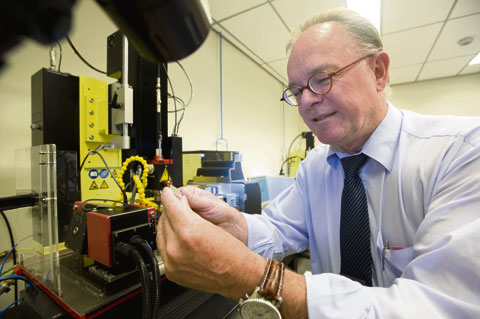The Electronic and Mechanical Support Division (Demo) opens a new workshop, specialising in manufacturing ultra fine mechanical prototypes for researchers.
The new microcenter itself isn’t very large – how could it be – but it does house some of the world’s best machines for fine mechanics. “No one has a similar machine,” Demo’s director, Gerrit Kahlman, boasts, standing next to a micro-milling machine, a tiny cutter, only half a millimetre thick, which rotates at more than 100,000 rpm. The material it must cut from the work piece lies underneath, like a fine layer of gold dust. The same room also houses a micro-drilling machine (which works by sparking away the material) and a spark-sawing machine. A vertical boring mill, and a micro-welding machine capable welding wires together down to 0.1 millimetres, complete the set.
Most work done here is so fine that one needs a stereoscopic microscope to see any of the action or results. Only then does one see that a sharp-edged letter ‘T’ has emerged, for instance. The ‘T’ measures only half a millimetre and has been spark-drilled for demo purposes into a piece of metal.
The microcenter has been set up in response to the trend that Kahlman noticed in the demand for smaller, finer and evermore complex instruments. Demo has long been catering to the needs of Professor Henny Zandbergen (Applied Sciences), who requires very fine instruments for positioning and manipulating samples under the electron microscope. Another returning customer is Dr Paul Breedveld, from Mechanical, Maritime and Materials Engineering faculty, who, in his biomechanical engineering work, develops surgeon’s tools, especially for surgery of the eye, ear and brain, which requires ever-finer instruments.
The microcenter is the keystone for Demo, says Kahlman. Demo can facilitate researchers in designing and building prototypes and research equipment, both in electronics and mechanics. “We can now operate anywhere in between the microscopic scale and that of the Ampelmann offshore platform.”
Demo, which employs 90 people at various locations around campus, works primarily for (PhD)researchers and YesDelft startups, offering design and prototyping for half of the real costs, with the university financing the rest.
Opening Demo on Thursday, 26 May, at 15:30, by the Rector. Info: demo.tudelft.nl
Vorige week hebben de Universiteit Leiden, de Universiteit Utrecht, de Erasmus Universiteit Rotterdam en de twee Amsterdamse universiteiten, de VU en de UvA, daartoe een convenant ondertekend. De subsidie werd al in 2007 aangekondigd in de strategische agenda van oud-minister Plasterk. In 2008 maakten de vijf brede hogescholen in de Randstad vergelijkbare afspraken.
Vijftig tot zestig procent van alle niet-westerse studenten volgt een opleiding aan een hogeschool of universiteit in een van de vier grote steden. Ze doen het vaak minder goed dan autochtone studenten. In het wo heeft na zes jaar 47 procent van de autochtone studenten een diploma gehaald, tegen 35 procent van de niet-westerse allochtone studenten. In het hbo is dat verschil nog groter, bijna twintig procent.
Relatief veel niet-westerse allochtonen kiezen voor het hbo terwijl ze ook naar de universiteit hadden gekund. Gaan ze wel naar de universiteit, dan oriënteren ze zich vaak niet goed. Ze kiezen te snel voor een studie die opleidt tot een ‘zichtbaar beroep’, zoals arts of advocaat, maar die soms niet goed bij hen past.
De universiteiten maakten nog geen afspraken over streefcijfers voor de instroom of het studierendement. De precieze verdeling van het geld is nog niet openbaar gemaakt. Alleen de Universiteit Leiden maakte al bekend dat ze jaarlijks 4,5 ton zal ontvangen.



Comments are closed.